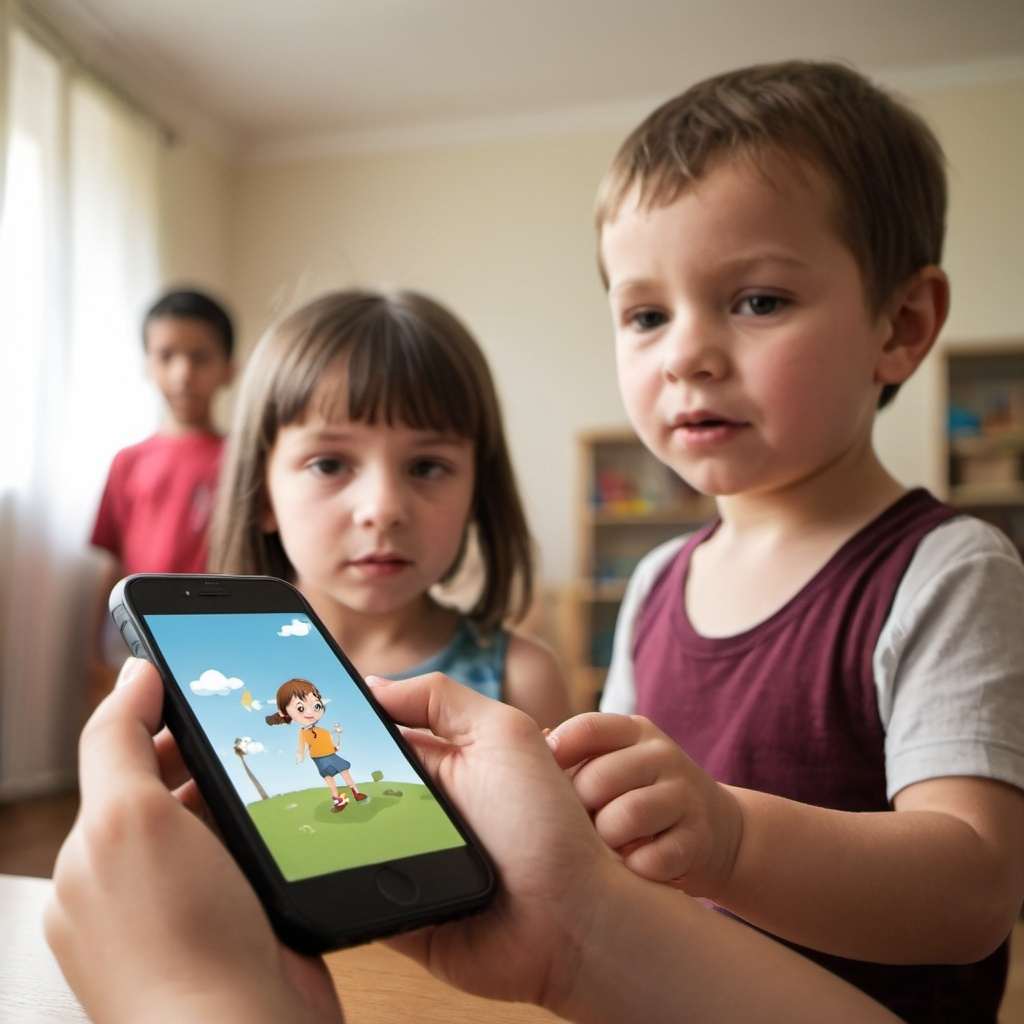Contents:
–When I Met Pone
–Human Nature Makes Us Vulnerable to Screen Addiction
–Human Nature Magnifies The Potential Harm Of Screen Use
–Promoting Balanced Screen Use–
I don’t know when I met Pone, but I was around one year old. My fifth birthday is next week, so that’s a long time ago.
While the ‘when’ is unclear, I remember the ‘where’. I was in my pram. I’m much too big for it now, but it’s just the size for my sister. She’s two, and she’s already met Pone, too.

I was with my parents. It was just after I had woken up that lots of people were sitting at small tables, drinking out of cups and talking to each other. There were so many tables that Mum had trouble getting me and the pram in.
As I looked up, the usual targets stretched over the pram were within my reach. I had mastered hitting at least one of them every time I tried. Recently I had figgered out that the hands in front of me were mine and it was great fun getting them to do what I wanted. Both hands even! Those balls and stars were toast, and my delight was even better when they rattled every time I hit them. Whack! Rattle! Woot!
For a while, it was good fun. But as I have learned over and over since, if you wanna have fun, you gotta be doing something. And sooner or later, it’s gotta be something different. I lost interest in my targets and wanted some attention, I wanted something different. So what’s a bub got to do to get attention? Easy peasy, cry!
On this particular morning, it took longer than I was happy with. Oh, lots were going on around me, people talking and laughing, but none of it included me. When I started to get upset, my parents handed Pone to me. That’s my memory of how I met Pone.
Pone was showing a ‘tube’. There was music, and it was funky. Wow! It calmed me down. It showed me many weird puppies that talked, danced, and were having fun. Pone ignored everything but me and made me excited and happy. Pone and I were the best of friends right from the start.
In recent years, Pone and I have become a great team. Pone seems to know how to keep me entertained and happy with all the interesting videos and music. When I spend time with Pone, nothing else matters except when I get hungry.
Especially now that my little sister Emily has come along and my parents are so busy, Pone has been a lifesaver. Being with Pone makes me happy.

I almost forgot to mention that Pone has started playing games with me. Until recently, it’s mostly been about the tubes, which I don’t mind, despite what my parents say. It’s been great!
However, watching tubes can get boring after a while. On the other hand, games are hardly ever dull. Games are so much fun as long as I know what to do and can do.
I can play with Emily, but that’s not as good as playing with Pone. Emily doesn’t know what to do most of the time. My parents want me to play with her, but they don’t realize how difficult that can be. And even if she knows what to do, Emily never follows the rules.
I enjoy playing with Jax, my neighbour, although he’s older than me and always wants to win. I never seem to win when playing with Jax, and even if I do, he can be mean. Sometimes I don’t like playing with him.
On the other hand, playing with Pone is always pleasant. There are so many different games to choose from. When you win, Pone celebrates with stars, bells, and boings. If you don’t win, you can try as many times as you like to figure out how to win. Many times, if you keep trying, you eventually win, and it feels great. Pone makes me happy.
Pone never gets bored with you and always puts you first.

Okay, sometimes I prefer to play with Pone over doing other things. I would rather play with Pone than clean my teeth, get dressed, or ride my scooter. But, no matter what my parents think, it’s only sometimes.
If Pone is bad, why do my parents often want it for themselves? Why do they reward me with Pone for eating my dinner? How is it wrong to enjoy something that makes me feel good?
Anyway, that’s what I wanted to tell you. My birthday is coming up, and I will be five years old. I can invite anyone I want, and my parents have suggested a few more. It will be in the park around the BBQ (sort of like a stove), with streamers, balloons, and even a jumping castle. That’s funny, I know because castles don’t jump.
But the most exciting thing of all, I can’t wait. I overheard my Mom and Dad talking, and they were going to get me my very own Squeen. Did you know? Pone is a Squeen, or at least that’s what they said and Pone has a bigger brother called Tablit, who is an even better Squeen than Pone. Can you imagine that?
Seven sleeps to go.
Human Nature Makes Us Vulnerable To Screen Addiction
The immediacy of screens appeals strongly to human nature due to our innate needs and desires. Here’s a concise explanation of why:
Distorted Reality: Social media often presents an idealized version of people’s lives, which can lead to unrealistic comparisons and feelings of inadequacy and low self-esteem.
Attention Economy: The digital world is designed to capture and hold our attention, often at the expense of real-world interactions and experiences. This leads to a disconnection from our natural environment and social support systems.
Constant Connectivity: The always-on nature of digital devices can lead to chronic stress and anxiety, interfering with our ability to rest, recover, and maintain healthy stress responses.
Dopamine-Driven Feedback Loops: Social media platforms are designed to trigger dopamine releases, creating addictive behaviours that can override our natural instincts for balanced living.
In essence, screens provide a readily available, highly customizable platform that caters to our deepest psychological needs for recognition, validation, and importance. The immediacy and accessibility of this digital world make it an irresistible draw for many, as it offers a seemingly perfect solution to our constant search for affirmation and attention.
Human Nature Magnifies The Potential Harm Of Screen Use
Excessive screen use can significantly threaten the human survival instinct, particularly through social media and other digital platforms.
This threat is especially pronounced for children and teenagers due to their developmental stage and heightened vulnerability to social influences. Screen use, especially social media, creates an environment of constant comparison and competition that can negatively impact our survival instincts in several ways:
The adolescent brain is still developing, particularly the prefrontal cortex, which controls decision-making and impulse control. This development continues until the mid-20s, making younger individuals more susceptible to screen addiction and less capable of regulating their usage.
Teenagers have a heightened need for social acceptance and validation from their peers. Social media can intensify this need, making them more vulnerable to the negative effects of online comparison and cyberbullying.
Young people have limited real-world experiences, which can make it difficult for them to maintain perspective and counterbalance the distorted reality presented on screens.
The young brain is more adaptable, and excessive screen use can more easily reshape neural pathways, potentially altering cognitive and emotional development.
Excessive screen time can limit face-to-face social interactions, which are crucial for developing empathy, social skills, and emotional intelligence.
Promoting Balanced Screen Use
To lessen these risks, promoting balanced screen use, encouraging real-world experiences and connections, and teaching critical thinking skills to help young people navigate the digital landscape is essential.
Suggestions on how to do this is topic of the next Post